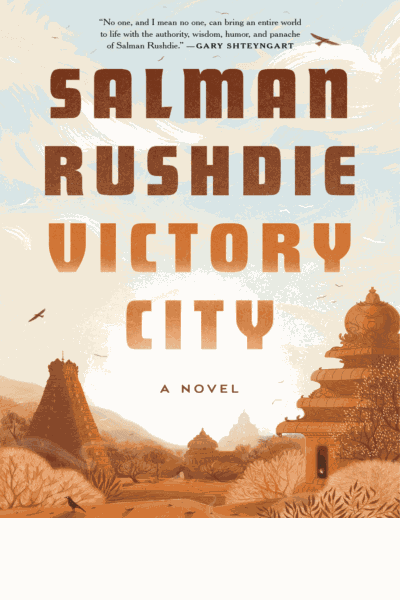
Victory City
Author/Uploaded by Salman Rushdie
Victory City is a work of fiction. Names, characters, places, and incidents are the products of the author’s imagination or are used fictitiously. Any resemblance to actual events, locales, or persons, living or dead, is entirely coincidental. Copyright © 2023 by Salman Rushdie All rights reserved. Published in the United States by Random House, an imprint and division of Penguin Random House LL...
Content Preview
Victory City is a work of fiction. Names, characters, places, and incidents are the products of the author’s imagination or are used fictitiously. Any resemblance to actual events, locales, or persons, living or dead, is entirely coincidental. Copyright © 2023 by Salman Rushdie All rights reserved. Published in the United States by Random House, an imprint and division of Penguin Random House LLC, New York. Random House and the House colophon are registered trademarks of Penguin Random House LLC. Published in the United Kingdom by Jonathan Cape, an imprint of Vintage, part of the Penguin Random House group of companies, and in Canada by Knopf Canada, an imprint of Penguin Random House Canada. Library of Congress Cataloging-in-Publication Data Names: Rushdie, Salman, author. Title: Victory city: a novel / Salman Rushdie. Description: First Edition. | New York: Random House, [2023] Identifiers: LCCN 2022022929 (print) | LCCN 2022022930 (ebook) | ISBN 9780593243398 (hardcover) | ISBN 9780593243404 (ebook) Subjects: LCGFT: Novels. Classification: LCC PR6068.U757 V53 2023 (print) | LCC PR6068.U757 (ebook) | DDC 823/.914—dc23 LC record available at https://lccn.loc.gov/2022022929 LC ebook record available at https://lccn.loc.gov/2022022930 International edition ISBN 9780593597217 Ebook ISBN 9780593243404 randomhousebooks.com Cover illustration: Sonali Zohra ep_prh_6.0_142519746_c0_r0 For Hanan Contents Cover Part One: Birth Chapter 1 Chapter 2 Chapter 3 Chapter 4 Chapter 5 Chapter 6 Chapter 7 Chapter 8 Part Two: Exile Chapter 9 Chapter 10 Chapter 11 Chapter 12 Chapter 13 Part Three: Glory Chapter 14 Chapter 15 Chapter 16 Chapter 17 Chapter 18 Chapter 19 Part Four: Fall Chapter 20 Chapter 21 Chapter 22 Acknowledgments About the Author By Salman Rushdie _142519746_ PART ONE | Birth | 1 On the last day of her life, when she was two hundred and forty-seven years old, the blind poet, miracle worker, and prophetess Pampa Kampana completed her immense narrative poem about Bisnaga and buried it in a clay pot sealed with wax in the heart of the ruined Royal Enclosure, as a message to the future. Four and a half centuries later we found that pot and read for the first time the immortal masterpiece named the Jayaparajaya, meaning “Victory and Defeat,” written in the Sanskrit language, as long as the Ramayana, made up of twenty-four thousand verses, and we learned the secrets of the empire she had concealed from history for more than one hundred and sixty thousand days. We knew only the ruins that remained, and our memory of its history was ruined as well, by the passage of time, the imperfections of memory, and the falsehoods of those who came after. As we read Pampa Kampana’s book the past was regained, the Bisnaga Empire was reborn as it truly had been, its women warriors, its mountains of gold, its generosity of spirit and its times of mean-spiritedness, its weaknesses and its strengths. We heard for the first time the full account of the kingdom that began and ended with a burning and a severed head. This is that story, retold in plainer language by the present author, who is neither a scholar nor a poet but merely a spinner of yarns, and who offers this version for the simple entertainment and possible edification of today’s readers, the old and the young, the educated and the not so educated, those in search of wisdom and those amused by folly, northerners and southerners, followers of different gods and of no gods, the broad-minded and the narrow-minded, men and women and members of the genders beyond and in between, scions of the nobility and rank commoners, good people and rogues, charlatans and foreigners, humble sages, and egotistical fools. — The story of Bisnaga began in the fourteenth century of the Common Era, in the south of what we now call India, Bharat, Hindustan. The old king whose rolling head got everything going wasn’t much of a monarch, just the type of ersatz ruler who crops up between the decline of one great kingdom and the rise of another. His name was Kampila of the tiny principality of Kampili, “Kampila Raya,” raya being the regional version of raja, king. This second-rate raya had just about enough time on his third-rate throne to build a fourth-rate fortress on the banks of the Pampa river, to put a fifth-rate temple inside it, and to carve a few grandiose inscriptions into the side of a rocky hill, but then the army of the north came south to deal with him. The battle that followed was a one-sided affair, so unimportant that nobody bothered to give it a name. After the people from the north had routed Kampila Raya’s forces and killed most of his army they grabbed hold of the phony king and chopped off his crownless head. Then they filled it with straw and sent it north for the pleasure of the Delhi sultan. There was nothing particularly special about the battle without a name, or about the head. In those days battles were commonplace affairs and naming them was a thing a lot of people didn’t bother with; and severed heads were traveling across our great land all the time for the pleasure of this prince or that one. The sultan in his northern capital city had built up quite a collection. After the insignificant battle, surprisingly, there was an event of the kind that changes history. The story goes that the women of the tiny, defeated kingdom, most of them recently widowed as a result of the no-name battle, left the fourth-rate fortress, after making final offerings at the fifth-rate temple, crossed the river in small boats, improbably defying the turbulence of the water, walked some distance to the west along the southern bank, and then lit a great bonfire and committed mass suicide in the flames. Gravely, without making any complaint, they said farewell to one another and walked forward without flinching. Nor were there any screams when their flesh caught fire and the stink of death filled the air. They burned in silence; only the crackling of the fire itself
More eBooks









Lincoln's Wizard (Dragons of the Co...
Author: Dan Willis; Tracy Hickman
Year: 2023
Views: 35882
Read More